6.5 - 11.5 GHz High Power Amplifier TGA9083-SCC
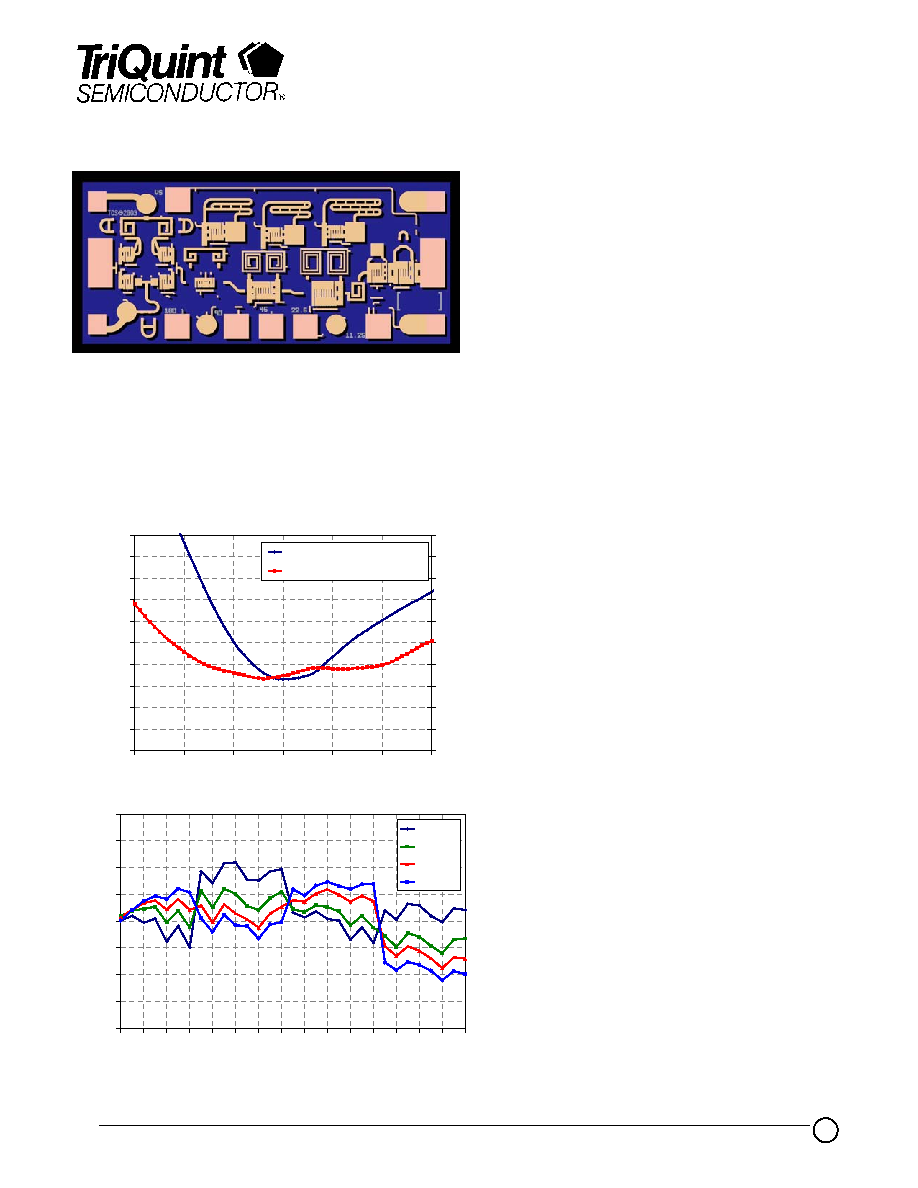
TriQuint Semiconductor Texas Phone : (972)994-8465 Fax: (972)994-8504 Web: www.triquint.com
Advance Product Information
July 30, 2003
1
Note: Devices designated as EPU are typically early in their characterization process prior to finalizing all electrical and process
specifications. Specifications are subject to change without notice.
35 GHz 5-Bit Phase Shifter
TGP2101-EPU
Key Features and Performance
·
Positive Control Voltage
·
Single-Ended Logic
·
CMOS Compatible
·
Frequency Range: 34 - 37 GHz
·
0.25µm pHEMT 3MI Technology
·
Chip dimensions:
1.58 x 0.75 x 0.1 mm
(0.062 x 0.030 x 0.004 Inches)
Preliminary Measured Performance
0
1
2
3
4
5
6
7
8
9
10
32
33
34
35
36
37
38
Frequency (GHz)
RMS Ph
ase Sh
ft Err (d
eg
)
0
0.2
0.4
0.6
0.8
1
1.2
1.4
1.6
1.8
2
RMS Am
p
litu
d
e
Er
r
o
r
(d
B)
RMS Phase Shift Error
RMS Amplitude Error
-20
-15
-10
-5
0
5
10
15
20
1
3
5
7
9 11 13 15 17 19 21 23 25 27 29 31
State
Ph
ase Erro
r (d
eg
)
34GHz
35GHz
36GHz
37GHz

TriQuint Semiconductor Texas Phone : (972)994-8465 Fax: (972)994-8504 Web: www.triquint.com
Advance Product Information
July 30, 2003
2
Note: Devices designated as EPU are typically early in their characterization process prior to finalizing all electrical and process
specifications. Specifications are subject to change without notice.
TGP2101-EPU
TABLE I
MAXIMUM RATINGS
Symbol
Parameter
Value
Notes
V
C
Control Voltage Range
0 - +8 V
1/ 2/
I
D
Control Supply Current
1 mA
1/ 2/
P
IN
Input Continuous Wave Power
20 dBm
1/ 2/
P
D
Power Dissipation
0.1 W
1/ 2/
T
CH
Operating Channel Temperature
150
0
C
3/
T
M
Mounting Temperature
(30 Seconds)
320
0
C
T
STG
Storage Temperature
-65 to 150
0
C
1/ These ratings represent the maximum operable values for this device
2/
Combinations of supply voltage, supply current, input power, and output power
shall not exceed P
D
at a package base temperature of 70
°C
3/ Junction operating temperature will directly affect the device median time to
failure (MTTF). For maximum life, it is recommended that junction temperatures
be maintained at the lowest possible levels.
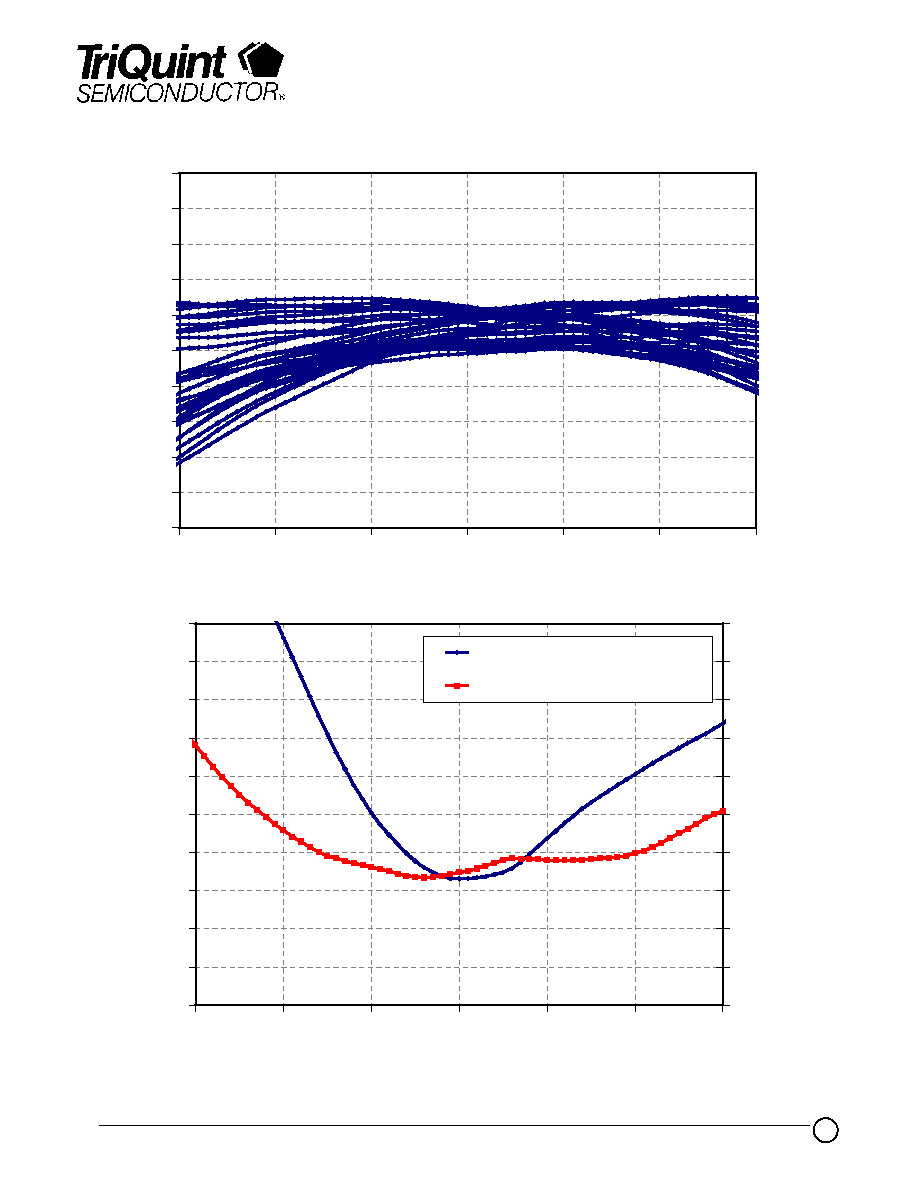
TriQuint Semiconductor Texas Phone : (972)994-8465 Fax: (972)994-8504 Web: www.triquint.com
Advance Product Information
July 30, 2003
3
Note: Devices designated as EPU are typically early in their characterization process prior to finalizing all electrical and process
specifications. Specifications are subject to change without notice.
TGP2101-EPU
Preliminary Measured Data
0
1
2
3
4
5
6
7
8
9
10
32
33
34
35
36
37
38
Frequency (GHz)
RMS Phase Shift Error (deg)
0
0.2
0.4
0.6
0.8
1
1.2
1.4
1.6
1.8
2
RMS Amplitude Error (dB)
RMS Phase Shift Error
RMS Amplitude Error
-13
-12
-11
-10
-9
-8
-7
-6
-5
-4
-3
32
33
34
35
36
37
38
Frequency (GHz)
S21 (dB)
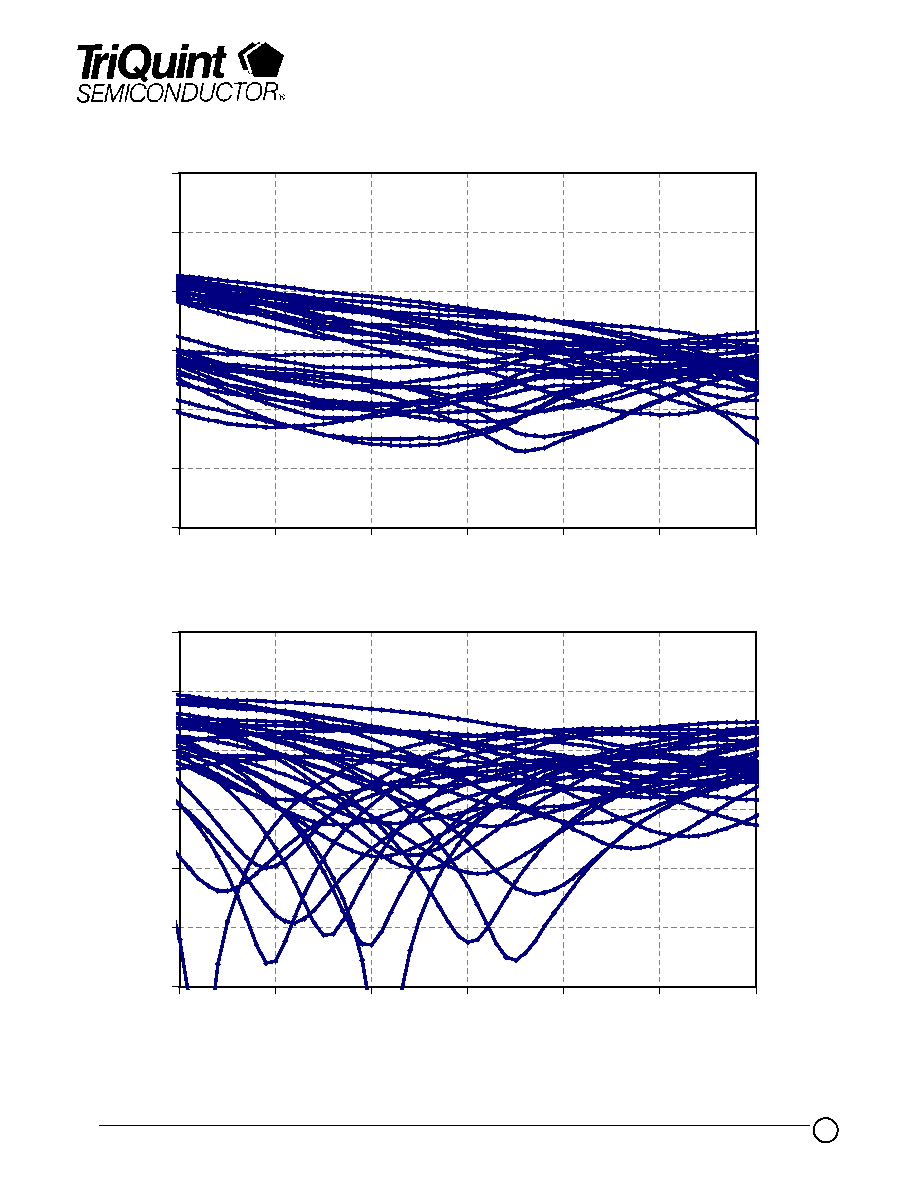
TriQuint Semiconductor Texas Phone : (972)994-8465 Fax: (972)994-8504 Web: www.triquint.com
Advance Product Information
July 30, 2003
4
Note: Devices designated as EPU are typically early in their characterization process prior to finalizing all electrical and process
specifications. Specifications are subject to change without notice.
TGP2101-EPU
Preliminary Measured Data
-30
-25
-20
-15
-10
-5
0
32
33
34
35
36
37
38
Frequency (GHz)
S11 (dB)
-30
-25
-20
-15
-10
-5
0
32
33
34
35
36
37
38
Frequency (GHz)
S22 (dB)
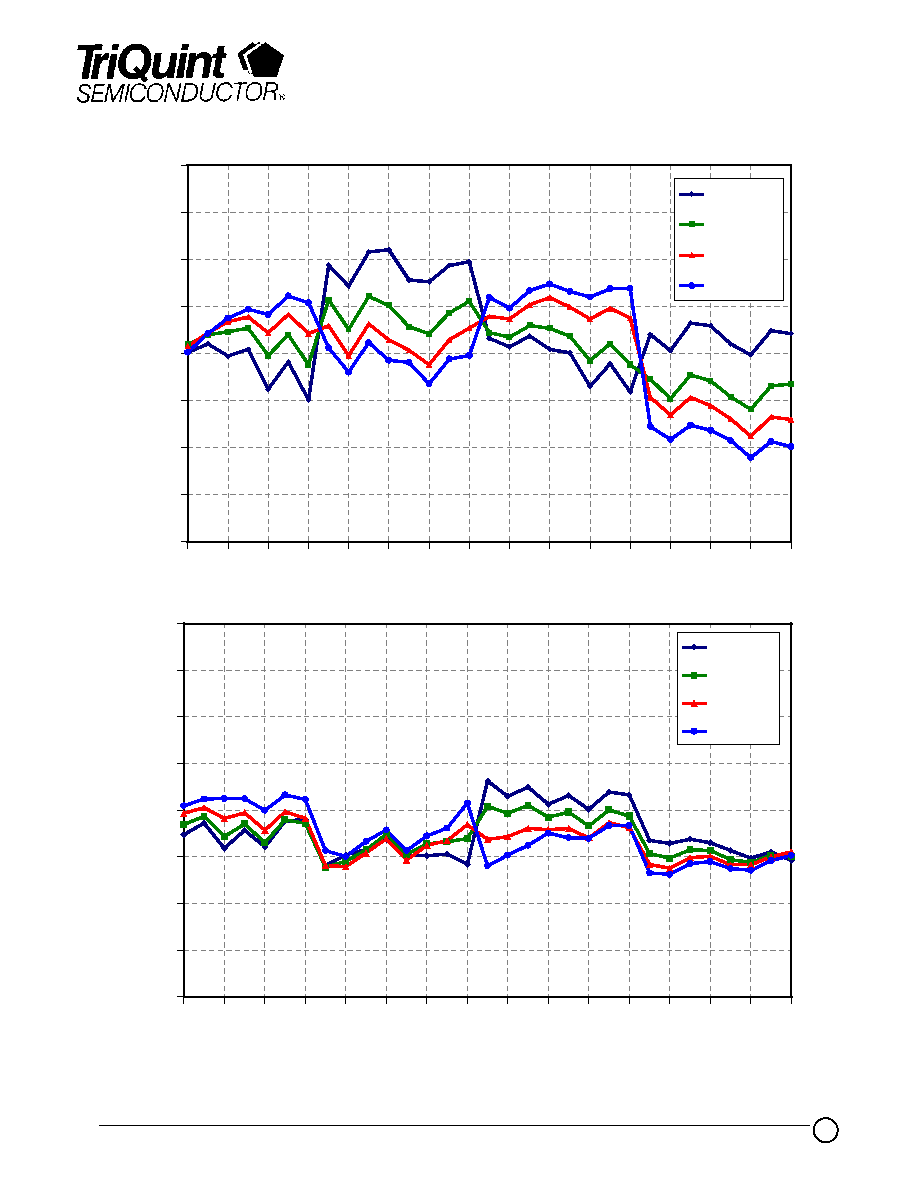
TriQuint Semiconductor Texas Phone : (972)994-8465 Fax: (972)994-8504 Web: www.triquint.com
Advance Product Information
July 30, 2003
5
Note: Devices designated as EPU are typically early in their characterization process prior to finalizing all electrical and process
specifications. Specifications are subject to change without notice.
TGP2101-EPU
Preliminary Measured Data
-4
-3
-2
-1
0
1
2
3
4
1
3
5
7
9
11 13 15 17 19 21 23 25 27 29 31
State
Amplitude Error (dB)
34GHz
35GHz
36GHz
37GHz
-20
-15
-10
-5
0
5
10
15
20
1
3
5
7
9 11 13 15 17 19 21 23 25 27 29 31
State
Phase Error (deg)
34GHz
35GHz
36GHz
37GHz

TriQuint Semiconductor Texas Phone : (972)994-8465 Fax: (972)994-8504 Web: www.triquint.com
Advance Product Information
July 30, 2003
6
Note: Devices designated as EPU are typically early in their characterization process prior to finalizing all electrical and process
specifications. Specifications are subject to change without notice.
TGP2101-EPU
State Table
State
V-Supply
V-11.25
V-22.5
V-45
V-90
V-180
Phase Shift
0
+5V
0V
0V
0V
0V
0V
Reference
1
+5V
+5V
0V
0V
0V
0V
11.25°
2
+5V
0V
+5V
0V
0V
0V
22.5°
3
+5V
+5V
+5V
0V
0V
0V
33.75°
4
+5V
0V
0V
+5V
0V
0V
45°
5
+5V
+5V
0V
+5V
0V
0V
56.25°
6
+5V
0V
+5V
+5V
0V
0V
67.5°
7
+5V
+5V
+5V
+5V
0V
0V
78.75°
8
+5V
0V
0V
0V
+5V
0V
90°
9
+5V
+5V
0V
0V
+5V
0V
101.25°
10
+5V
0V
+5V
0V
+5V
0V
112.5°
11
+5V
+5V
+5V
0V
+5V
0V
123.75°
12
+5V
0V
0V
+5V
+5V
0V
135°
13
+5V
+5V
0V
+5V
+5V
0V
146.25°
14
+5V
0V
+5V
+5V
+5V
0V
157.5°
15
+5V
+5V
+5V
+5V
+5V
0V
168.75°
16
+5V
0V
0V
0V
0V
+5V
180°
17
+5V
+5V
0V
0V
0V
+5V
191.25°
18
+5V
0V
+5V
0V
0V
+5V
202.5°
19
+5V
+5V
+5V
0V
0V
+5V
213.75°
20
+5V
0V
0V
+5V
0V
+5V
225°
21
+5V
+5V
0V
+5V
0V
+5V
236.25°
22
+5V
0V
+5V
+5V
0V
+5V
247.5°
23
+5V
+5V
+5V
+5V
0V
+5V
258.75°
24
+5V
0V
0V
0V
+5V
+5V
270°
25
+5V
+5V
0V
0V
+5V
+5V
281.25°
26
+5V
0V
+5V
0V
+5V
+5V
292.5°
27
+5V
+5V
+5V
0V
+5V
+5V
303.75°
28
+5V
0V
0V
+5V
+5V
+5V
315°
29
+5V
+5V
0V
+5V
+5V
+5V
326.25°
30
+5V
0V
+5V
+5V
+5V
+5V
337.5°
31
+5V
+5V
+5V
+5V
+5V
+5V
348.75°

TriQuint Semiconductor Texas Phone : (972)994-8465 Fax: (972)994-8504 Web: www.triquint.com
Advance Product Information
July 30, 2003
7
Note: Devices designated as EPU are typically early in their characterization process prior to finalizing all electrical and process
specifications. Specifications are subject to change without notice.
TGP2101-EPU
.00 [0.000]
.11 [0.004]
.12
[0.005]
.42 [0.016]
.43
[0.017]
.67 [0.026]
.81 [0.032]
.95 [0.037]
1.23 [0.048]
1.47 [0.058]
1.48 [0.058]
1.58 [0.062]
.00 [0.000]
.13 [0.005]
.12 [0.005]
.38 [0.015]
.63 [0.025]
.63 [0.025]
.75 [0.030]
Units: millimeters [inches]
Thickness: 0.10 [0.004] (reference only)
Chip edge to bond pad dimensions are shown to center of bond pads.
Chip size tolerance: ±0.05 [0.002]
RF ground through backside
Bond Pad #1
Bond Pad #2
Bond Pad #3
Bond Pad #4
Bond Pad #5
Bond Pad #6
Bond Pad #7
Bond Pad #8
RF Input
V-Supply (+5V)
RF Output
V-11.25 (ON V=+5V)
V-22.5 (ON V=+5V)
V-45 (ON V=+5V)
V-90 (ON V=+5V)
V-180 (ON V=+5V)
0.10 x 0.20
0.10 x 0.10
0.10 x 0.20
0.10 x 0.10
0.10 x 0.10
0.10 x 0.10
0.10 x 0.10
0.10 x 0.10
[0.004 x 0.008]
[0.004 x 0.004]
[0.004 x 0.008]
[0.004 x 0.004]
[0.004 x 0.004]
[0.004 x 0.004]
[0.004 x 0.004]
[0.004 x 0.004]
1
2
3
4
5
6
7
8
Mechanical Drawing
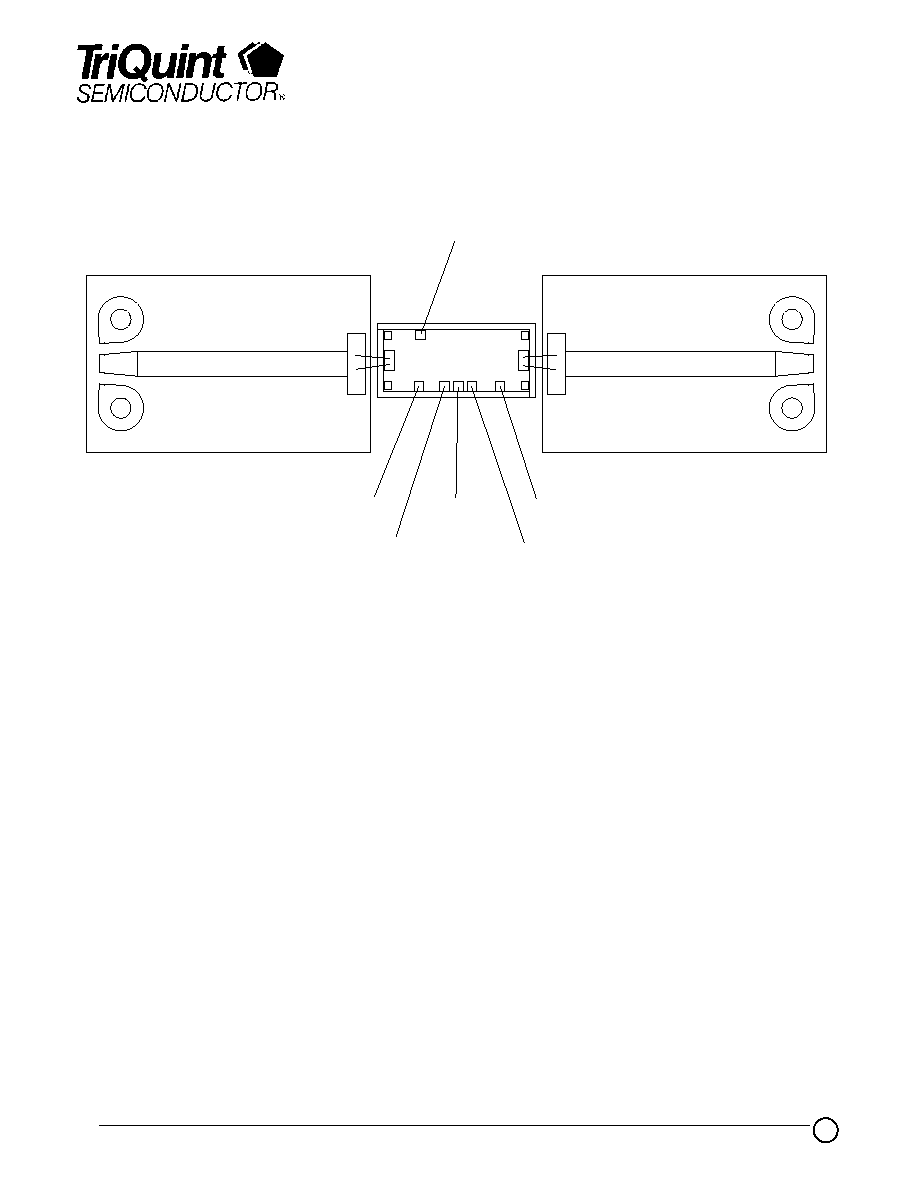
TriQuint Semiconductor Texas Phone : (972)994-8465 Fax: (972)994-8504 Web: www.triquint.com
Advance Product Information
July 30, 2003
8
Note: Devices designated as EPU are typically early in their characterization process prior to finalizing all electrical and process
specifications. Specifications are subject to change without notice.
GaAs MMIC devices are susceptible to damage from Electrostatic Discharge. Proper precautions should
be observed during handling, assembly and test.
TGP2101-EPU
RF Input
RF Output
V-Supply
V-180
V-90
V-45
V-22.5
V-11.25
Devices were tested with 500
W
resistors in series with control lines
Chip Assembly & Bonding Diagram

TriQuint Semiconductor Texas Phone : (972)994-8465 Fax: (972)994-8504 Web: www.triquint.com
Advance Product Information
July 30, 2003
9
Note: Devices designated as EPU are typically early in their characterization process prior to finalizing all electrical and process
specifications. Specifications are subject to change without notice.
GaAs MMIC devices are susceptible to damage from Electrostatic Discharge. Proper precautions should
be observed during handling, assembly and test.
TGP2101-EPU
Reflow process assembly notes:
· Use AuSn (80/20) solder with limited exposure to temperatures at or above 300°C.
(30 seconds maximum)
· An alloy station or conveyor furnace with reducing atmosphere should be used.
· No fluxes should be utilized.
· Coefficient of thermal expansion matching is critical for long-term reliability.
· Devices must be stored in a dry nitrogen atmosphere.
Component placement and adhesive attachment assembly notes:
· Vacuum pencils and/or vacuum collets are the preferred method of pick up.
· Air bridges must be avoided during placement.
· The force impact is critical during auto placement.
· Organic attachment can be used in low-power applications.
· Curing should be done in a convection oven; proper exhaust is a safety concern.
· Microwave or radiant curing should not be used because of differential heating.
· Coefficient of thermal expansion matching is critical.
Interconnect process assembly notes:
· Thermosonic ball bonding is the preferred interconnect technique.
· Force, time, and ultrasonics are critical parameters.
· Aluminum wire should not be used.
· Maximum stage temperature is 200°C.
Assembly Process Notes
Document Outline








